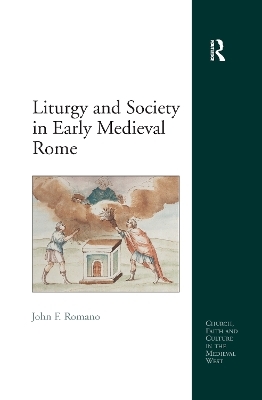
Liturgy and Society in Early Medieval Rome
Seiten
2020
Routledge (Verlag)
978-0-367-60082-2 (ISBN)
Routledge (Verlag)
978-0-367-60082-2 (ISBN)
The liturgy, the public worship of the Catholic Church, was crucial in forging the society of early medieval Rome, in that it oriented Roman society to God and fostered the dominance of the clergy. This study places the liturgy centre stage, filling a gap in research on early medieval Rome and demonstrating the utility of investigating how it funct
The liturgy, the public worship of the Catholic Church, was a crucial factor in forging the society of early medieval Rome. As the Roman Empire dissolved, a new world emerged as Christian bishops stepped into the power vacuum left by the dismantling of the Empire. Among these potentates, none was more important than the bishop of Rome, the pope. The documents, archaeology, and architecture that issued forth from papal Rome in the seventh and eighth centuries preserve a precious glimpse into novel societal patterns. The underexploited liturgical sources in particular enrich and complicate our historical understanding of this period. They show how liturgy was the ’social glue’ that held together the Christian society of early medieval Rome - and excluded those who did not belong to it. This study places the liturgy center stage, filling a gap in research on early medieval Rome and demonstrating the utility of investigating how the liturgy functioned in medieval Europe. It includes a detailed analysis of the papal Mass, the central act of liturgy and the most obvious example of the close interaction of liturgy, social relations and power. The first extant Mass liturgy, the First Roman Ordo, is also given a new presentation in Latin here with an English translation and commentary. Other grand liturgical events such as penitential processions are also examined, as well as more mundane acts of worship. Far from a pious business with limited influence, the liturgy established an exchange between humans and the divine that oriented Roman society to God and fostered the dominance of the clergy.
The liturgy, the public worship of the Catholic Church, was a crucial factor in forging the society of early medieval Rome. As the Roman Empire dissolved, a new world emerged as Christian bishops stepped into the power vacuum left by the dismantling of the Empire. Among these potentates, none was more important than the bishop of Rome, the pope. The documents, archaeology, and architecture that issued forth from papal Rome in the seventh and eighth centuries preserve a precious glimpse into novel societal patterns. The underexploited liturgical sources in particular enrich and complicate our historical understanding of this period. They show how liturgy was the ’social glue’ that held together the Christian society of early medieval Rome - and excluded those who did not belong to it. This study places the liturgy center stage, filling a gap in research on early medieval Rome and demonstrating the utility of investigating how the liturgy functioned in medieval Europe. It includes a detailed analysis of the papal Mass, the central act of liturgy and the most obvious example of the close interaction of liturgy, social relations and power. The first extant Mass liturgy, the First Roman Ordo, is also given a new presentation in Latin here with an English translation and commentary. Other grand liturgical events such as penitential processions are also examined, as well as more mundane acts of worship. Far from a pious business with limited influence, the liturgy established an exchange between humans and the divine that oriented Roman society to God and fostered the dominance of the clergy.
John F. Romano is Assistant Professor of History at Benedictine College in Atchison, Kansas, where he teaches ancient and medieval history and serves as Chair of the History Department. His research interests focus on medieval liturgy, and he has previously published articles in Mediaeval Studies, Viator and Sacris Erudiri.
Contents: Introduction; Mass in early medieval Rome; Shaping the papal court by liturgy; Unifying the city through liturgy; Defining a society through worship; Prayer in Roman society; Conclusion; Appendices; Select bibliography; Index.
| Erscheinungsdatum | 01.07.2020 |
|---|---|
| Reihe/Serie | Church, Faith and Culture in the Medieval West |
| Verlagsort | London |
| Sprache | englisch |
| Maße | 156 x 234 mm |
| Gewicht | 453 g |
| Themenwelt | Geisteswissenschaften ► Archäologie |
| Geschichte ► Allgemeine Geschichte ► Vor- und Frühgeschichte | |
| Geschichte ► Allgemeine Geschichte ► Altertum / Antike | |
| Geschichte ► Allgemeine Geschichte ► Mittelalter | |
| Geisteswissenschaften ► Geschichte ► Regional- / Ländergeschichte | |
| Religion / Theologie ► Christentum ► Kirchengeschichte | |
| ISBN-10 | 0-367-60082-X / 036760082X |
| ISBN-13 | 978-0-367-60082-2 / 9780367600822 |
| Zustand | Neuware |
| Informationen gemäß Produktsicherheitsverordnung (GPSR) | |
| Haben Sie eine Frage zum Produkt? |
Mehr entdecken
aus dem Bereich
aus dem Bereich
Konzepte – Methoden – Theorien
Buch | Softcover (2024)
UTB (Verlag)
CHF 55,85
Was Pompeji über uns erzählt
Buch | Hardcover (2023)
Propyläen (Verlag)
CHF 44,75
auf den Spuren der frühen Zivilisationen
Buch | Hardcover (2023)
C.H.Beck (Verlag)
CHF 27,95


